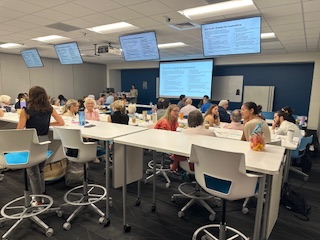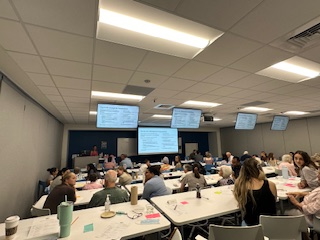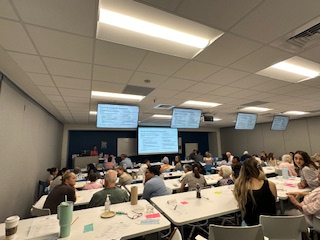The Essential Conversations in Healthcare workshop, which helps healthcare professionals prepare for end-of-life conversations, is in its sixth year.
Share:
Share this page on Facebook
Share this page on X (formerly Twitter)
Share this page on LinkedIn
Email this page to a friend
Print this page
Elon University's College of Health Sciences' Anatomical Gifts Program, a founding partner of the Essential Conversations in Healthcare Workshop, celebrated its sixth successful event this year. This achievement is an important milestone in improving communication skills in healthcare and a testament to our collective dedication.
This year, the interactive event was held in the newly renovated classrooms of the Gerald L. Francis Center. Thirty-six second-year PA students and 19 community volunteers played a central role in achieving the goals of the three-hour workshop.
Diane Parson, director of the Anatomical Gifts Program at Elon Health Sciences, tapped Alison Russo, a physician assistant on the cardiac surgery team at UNC-Chapel Hill, to co-facilitate the event. Russo, who benefited from the workshop as a Master of Science student in the Physician Assistant Studies Program, cited several occasions in his profession where he needed to source a toolkit from essential conversations in healthcare. . Russo readily accepted the offer, and the two expanded the workshop further.
“Involving community members in end-of-life conversations has greatly improved my ability to navigate sensitive discussions with patients and their families,” Russo said. “Practicing these conversations in a supportive environment has given me valuable insight into the emotions, fears, and hopes that often accompany such topics. This experience has given me empathy and clarity. As I facilitated these conversations, I developed the skills to approach patients with compassion and ensure that their wishes were respected while providing much-needed support to their loved ones. We are reminded of the importance of communication and the profound impact it has on the end-of-life experience.”
Lisa Hanau, a clinical and community educator with AuthoraCare Collective, was a guest speaker at the workshop and noted that this is an example of something everyone should consider doing. It's about thinking about what gives meaning to our lives and sharing our stories and aspirations with others.
“This is an ongoing gift that we can give ourselves and those we care about, allowing us to understand someone’s wishes and use their values to guide our decisions.” No one is ever in a crisis situation unless they have someone to speak for them,” Hanau said.
Kate Wheatley, director of resident services for Twin Lakes Community, was one of the course participants and highly recommends the course.
“The sessions were incredibly well-structured, engaging and perfectly balanced between theory and practice,” Mr Wheatley said. “The facilitators were knowledgeable and approachable, fostering an open environment where participants felt comfortable sharing their experiences and insights. One of the highlights for me was interacting with the students and sharing my experiences. This allowed us to discuss and practice important communication skills in real-life scenarios. This hands-on approach reinforced the concepts we discussed and made the learning experience fun and impactful. It became something.”
Preparing for end-of-life conversations
Diane Persson, director of the Anatomical Gifts Program in the College of Health Sciences, recognizes the lack of communication across healthcare to better prepare people for the important end-of-life conversations they have as healthcare professionals. I came up with an idea. Develop humility, empathy, compassion, and respect.

Parson expanded on the idea of pairing students with community volunteers, explaining that the goal is to “foster connections and help give a voice to patients, their families, and future health care providers.” . In 2019, Parson shared the course proposal with colleague Tracy Saenz, associate professor of physician assistant research. The two sought a partnership with Design Thinking Director Daniel Lake to develop a pilot workshop, which took place in December 2019.
Students and community volunteers were participants and beneficiaries of the workshop. They approached this concept with gratitude, inspiration, and motivation. The profound impact the workshop had on them, as evidenced by the post-workshop survey results, is evidence of the transformative power of Essential Conversations.
Having open and honest conversations with loved ones during a medical crisis can be daunting. Conversational skill sets are critical to fostering respectful understanding of medical decisions. Survey results from some of our PA students attest to the effectiveness of the workshops.
“It was useful for people who have never had this kind of conversation before.'' “I thought it was a really valuable lesson.'' “The course emphasizes interpersonal relationships and is thorough.'' “The various worksheets are , it helped me narrow down my thoughts.”
The support from our community participants is unparalleled.
“It was a real honor to be a part of the Crucial Conversations program.” “I always feel like I learn as much from my students as they learn from me. I'm looking forward to it. “The overall structure of the course was good. The students were really great.'' “They made a concerted effort to share terminal diagnoses and potential challenges with patients and to deal with them wisely. I am grateful for the opportunity to meet with Elon Healthcare students. Their understanding of the many concerns surrounding human death will benefit everyone.” “Oh! About the end of life. The sessions were stimulating as we shared our personal and sensitive thoughts with the PA students.As older adults, we offered our personal insights and values developed over the years. The interactions were very open and we felt a real sense of camaraderie among the students. We still exchange emails!”
With some modifications, Essential Conversations in Healthcare is an established model for addressing the need for effective conversations between patients and healthcare providers about complex diagnoses and deaths. Modifications included community volunteer orientation prior to the workshop. The focus shifted from scripts to organic conversations between community volunteers and students. Community volunteers bring their life experiences and interact with students who will have similar conversations with future patients.
There is an emphasis on recognizing that conversations about end-of-life decisions can carry emotional weight and complexity. Essential Conversations provides guidelines, safe spaces, support, and toolkits to guide students and community volunteers.
Sharing a person's wishes for end-of-life care can make a difference in how important end-of-life planning and diagnosis proceed. This workshop will give you the ability and confidence to provide end-of-life care conversations and help patients and their families make informed decisions about their future medical care, minimizing discomfort and fear. and allow patients to express their personal choices.

“After completing the workshop, I felt more confident in handling difficult conversations in medical settings,” Wheatley said. “The tools and techniques I gained were invaluable and I appreciate the emphasis on empathy and understanding throughout the training. Overall, this workshop was a great investment in my professional development.” I look forward to attending many more sessions. Elon's Essential Conversations truly delivers on its promise to enhance communication in healthcare.”

